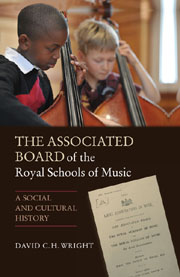Book contents
- Frontmatter
- Contents
- List of Illustrations
- List of Tables
- Dedication
- Preface
- List of Abbreviations
- Miscellaneous Conventions
- Introduction: The Context for a History
- I THE BACKGROUND
- II THE BOARD ESTABLISHED, 1889–1920
- III THE INSTITUTIONAL CULTURE, 1920–83
- 6 The Inter-War Years
- 7 The Board in Wartime
- 8 The Post-War Board
- 9 Too Much Success: the 1960s and 1970s
- IV THE BOARD REVIVED, 1983–2009
- Appendix 1 Speech and Drama Examinations
- Appendix 2 ABRSM Personalia, 1889–2010
- Select Bibliography
- Index
9 - Too Much Success: the 1960s and 1970s
from III - THE INSTITUTIONAL CULTURE, 1920–83
Published online by Cambridge University Press: 05 July 2013
- Frontmatter
- Contents
- List of Illustrations
- List of Tables
- Dedication
- Preface
- List of Abbreviations
- Miscellaneous Conventions
- Introduction: The Context for a History
- I THE BACKGROUND
- II THE BOARD ESTABLISHED, 1889–1920
- III THE INSTITUTIONAL CULTURE, 1920–83
- 6 The Inter-War Years
- 7 The Board in Wartime
- 8 The Post-War Board
- 9 Too Much Success: the 1960s and 1970s
- IV THE BOARD REVIVED, 1983–2009
- Appendix 1 Speech and Drama Examinations
- Appendix 2 ABRSM Personalia, 1889–2010
- Select Bibliography
- Index
Summary
The ABRSM ‘house’ composers
IN the post-war Britain of the 1940s and 1950s, many felt there was a sense of cultural suffocation about British life, despite the liberating, though demanding, cultural agenda of radio's Third Programme. The feeling of British insularity is tellingly captured by film producer Lindsay Anderson:
coming back to Britain is also, in many respects, like going back to the nursery. The outside world, the dangerous world, is shut away: its sounds are muffled … Nanny lights the fire, and sits herself down with a nice cup of tea and yesterday's Daily Express; but she keeps half an eye on us too.
Some felt that the ABRSM had cast itself in the role of the nation's musical nanny, keeping the dangers of the outside world away as though the musical revolutions in Europe and the USA had never occurred. What is now forgotten is that when William Glock began to bring a breath of fresh musical air to the Proms in 1960, it was enthusiastically welcomed, the age range of the Prommers suddenly dropped and their numbers increased. In the 1960s and 1970s Glock and the new radio producers he had recruited reshaped the BBC's serious music output. Against this appearance of radical new music and the new vogue for ‘authentic’ historical performance, the Board's musical stance seemed even more outdated. Rather than commissioning a younger generation of composers to contribute to its syllabus, the Board stuck to its cultural last, and the sense of an anachronistic disjuncture between music in education and music elsewhere grew stronger.
- Type
- Chapter
- Information
- The Associated Board of the Royal Schools of MusicA Social and Cultural History, pp. 144 - 168Publisher: Boydell & BrewerPrint publication year: 2013



